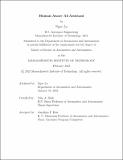Human-Aware AI-Assistant
Author(s)
La, Ngoc
DownloadThesis PDF (2.873Mb)
Advisor
Shah, Julie A.
Terms of use
Metadata
Show full item recordAbstract
In many complex situations like high demand kitchens or busy emergency rooms, humans often have to make high quality decisions under high pressure in a short amount of time. Having an AI-assistant with the ability to support humans in those scenarios can help reduce the workload and stress thus improving their performance. In this thesis, we aim to design and implement an AI-assistant that has the ability to provide useful recommendations when necessary. To achieve this goal, the AI-assistant needs to be able to plan good actions according to the situation, predict humans’ behaviors, and utilize this information to provide useful recommendations to humans when necessary. With these requirements, the AI-assistant is designed with three components: planning, inference, and communication. A simulated kitchen environment with two levels of actions, subtask and primitive action, is used as a platform for designing, implementing, and testing the AI-assistant. Six supervised learning methods and two Deep Q Network structures are trained and analyzed to find the best models for the AI-assistant’s planning and inference systems. The results of training and testing different methods suggest using the DQN models as planners for simple scenarios without accidents, and Decision Tree classifiers as planners for more complicated scenarios. The AI-assistant’s inference system is built with Decision Tree classifiers. Two communication protocols, discrete and extended protocols, are carefully studied to make sure the AI-assistant has the ability to provide recommendations just-in-time. While the discrete protocol is easier to tune, the extended protocol performs better in some cases. In conclusion, the AI-assistant with three components is successfully built and proven to help improve agents’ performance in multiple Overcooked scenarios.
Date issued
2023-02Department
Massachusetts Institute of Technology. Department of Aeronautics and AstronauticsPublisher
Massachusetts Institute of Technology